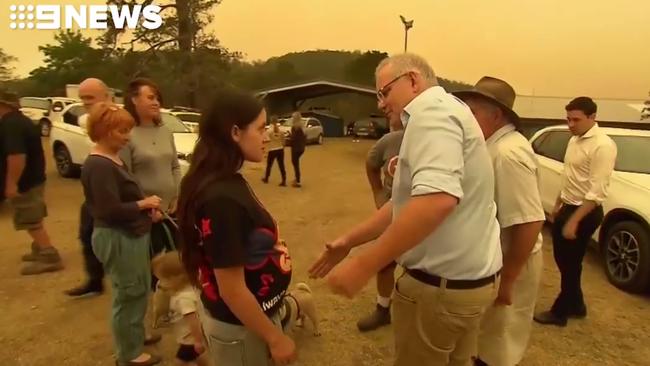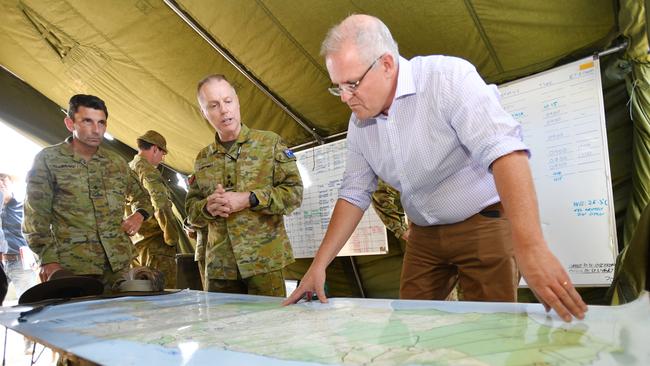Scott Morrison flags bushfires royal commission, increasing emissions reduction policies
PM says Australia may not need to use Kyoto carry-over credits to meet 2030 emissions reduction target, acknowledges missteps in bushfire response.

Scott Morrison has rejected the need to set a more ambitious 2030 emissions reduction target in the wake of Australia’s bushfire crisis but says the government may not need to use Kyoto carry-over credits to “meet and beat” its commitments under the Paris agreement.
In a half-hour interview on ABC TV on Sunday morning, the Prime Minister did not rule out increasing the government’s 2030 emissions reduction target and said actions to make Australia more resilient and adapt to climate change required greater attention.
The government’s climate change policies would “evolve” without putting people’s jobs at risk.
Mr Morrison later clarified at a press conference in Parliament House the government had set its target of 26-28 per cent below 2005 levels but would look to “meet and beat” it.
“We will always be taking up the opportunities of measures that enable us to achieve lower emissions, but lower emissions at the same time as we stay true to the policy I took to the last election, and that was to ensure we get the balance right, to get our emissions down without putting a tax on people, without increasing their electricity prices, without removing the industries upon which they and their communities and their towns and their regions rely on for their very livelihoods. So it’s a balanced policy,” Mr Morrison said.
“There will be new technologies, as there has been since the Kyoto targets were first set, and we will look to embrace those and we will look to take the opportunities that are in front of us to ensure that we don’t just meet these targets but we beat the targets that we have set.”
Asked if the use of Kyoto carry-over credits to meet the 2030 target could be dropped, Mr Morrison said: “There has always been the option to have those carryover credits and they’ve been used in the past and if they’re needed, it is the government’s policy to use them in the future.”
Mr Morrison said on the ABC the government may not need to use carry-over credits to beat its 2030 target, as he focuses on climate change “adaptation and resilience” measures.
“Building dams is key to that. Native vegetation management is key to that. Land clearing is key to that. Where you can build homes, is key to that. And that is as much a climate change response as emissions reduction,” Mr Morrison said.
Government sources said it was simply a statement of fact that carry-over credits would not be required if emissions were adequately reduced through other means.
.@InsidersABC host @David_Speers interviews the Prime Minister @ScottMorrisonMP #auspol https://t.co/BKorVKta3n
— ABC News (@abcnews) January 11, 2020
Following weeks of criticism over his leadership during Australia’s unprecedented bushfire season, which has seen fires burning since September along the east coast and in Western Australia, Mr Morrison said a royal commission “will be necessary” but it must be done in consultation with the states and territories.

The royal commission will look at the operational response of the federal and state governments to the bushfires, the Australian Defence Force’s role and a potentially new role for the commonwealth after it issued a call-out for 3000 reservists, as well as the effects of climate change.
“I’ll be taking a proposal through cabinet to that end,” Mr Morrison said.
There was a “very new appetite” and expectation from the Australian people that the federal government would respond directly to bushfires, which has traditionally been the responsibility of the states.
Mr Morrison conceded there were “things I could have handled on the ground much better” after he was heckled during a visit to the fire-ravaged NSW south coast town of Cobargo where a firefighter refused to shake his hand.
“95 per cent or there abouts of the responses I’ve had in these cases have been very positive and very appreciative but these are very sensitive, they’re very emotional environments. Prime ministers are flesh and blood too in how they engage with people,” Mr Morrison said.

“When I went into these places, I went there in the good faith and with Jenny on occasions, to provide what comfort and consolation I could. They were very strained environments and I think we need to think a little harder about how we do those.
“I’ve had many, I think, very effective visits that have been away from the cameras as well. That makes people a lot more able to engage with you. There have been some things we would do differently and we learn from every event but the most important thing is the action we have now taken and the steps we are taking to recovery.”
Mr Morrison revealed the government received constitutional advice before deciding on a compulsory call-out of ADF reservists but said in the future that should be done more seamlessly and pre-emptively.

ADF assets should be deployed where the chief of the defence force “believes there is a risk to life and safety”.
“We have to prepare for a new normal,” Mr Morrison said.
“There is a community expectation now that there be a more direct ability for the commonwealth, particularly through the Australian defence forces to be able to take action.
“What happened last Saturday, this was the change, the big change, historic change, it moved from a ‘respond to request’ posture to a ‘move and integrate’ posture, which means the defence force moving in and then coming in and working with the local effort without request, without any instigation at a state level.”








To join the conversation, please log in. Don't have an account? Register
Join the conversation, you are commenting as Logout